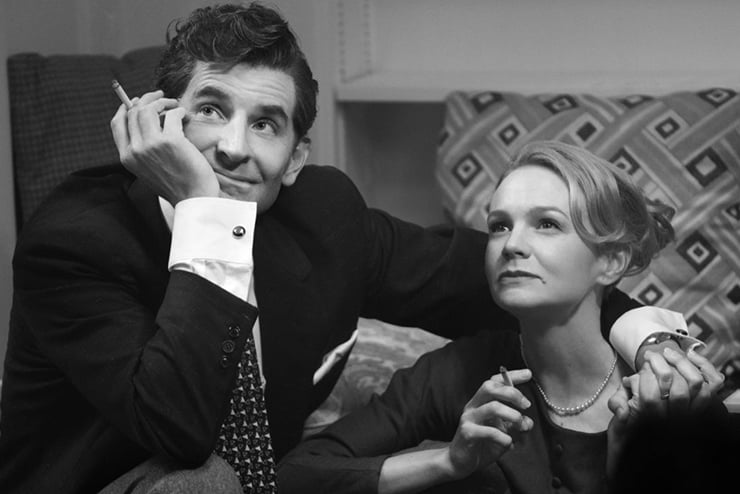Bradley Cooper is a talented actor, and with his film Maestro (2023)—now streaming on Netflix—he has expanded his oeuvre. Cooper directed, co-wrote, and starred in a film about the American conductor and composer Leonard Bernstein. Any biopic is a grand undertaking for a director but Cooper’s efforts as both director and an actor (he plays Bernstein) are proof of his unique cinematic vision and abilities.
The work is unique partly because Maestro is not a linear, cradle-to-grave story. Rather, it focuses on the relationship between Leonard Bernstein and his wife, Felicia Montealegre Cohn (played with enchanting perfection by Carey Mulligan). Cooper singles out this strange marriage and weaves it throughout the story as the common thread that inevitably influenced Bernstein creatively.
It may be difficult to accept a film about Leonard Bernstein that does not deal with his (or Felicia’s) leftist political and social activism. How can anyone forget the superb explication by Tom Wolfe of the Bernsteins’ party given in honor of Black Panthers, Radical Chic & Mau-Mauing the Flak Catchers?
Likewise, what can one make of a film that does not delve deeply into Bernstein’s work as a conductor and composer? But this was not Cooper’s intention at all. Instead, we are asked to become witness to the idea of the space between private and public life for people who, quite clearly, have a public existence, and the strangeness of a marriage that is essentially based on a lie.
The film begins with Bernstein’s 1943 debut as a conductor. Immediately, we become privy to Bernstein’s private life—he was in bed with another man, David Oppenheim (Matt Bomer), a fellow musician. It’s clear that Bernstein was a homosexual and that most of his associates were other musicians who are also gay but in secret.
Things began to change for Bernstein when he meets Felicia Montealegre, a Chilean-American actress. There was a clear attraction between the two but obviously their courting was rather odd given Bernstein’s sexual orientation. (Although this is only briefly mentioned in the film, Felicia broke off their first engagement and married Richard Hart instead. It was only after Hart’s death that she and Leonard married.)
By anyone’s standards, the Bernsteins lived a normal, American life. They had three children, Leonard was successful in every possible way, and Felicia even had some time to devote to acting. But the shadow of Leonard’s homosexuality loomed large over this odd marriage. Neither Leonard nor Felicia could escape it.
Throughout their marriage, Leonard frequently engaged in sexual affairs with men, and Felicia looked the other way. Or at least, she tried. At some point, she was unable to cope, and Leonard left her, publicly announcing his homosexuality. This separation was broken by Felicia’s encroaching illness (breast cancer that spread to her lungs) and during which Leonard became a presence in her life again, up until her death in 1978. (Leonard would live until 1990.)
Bernstein is portrayed as an utterly self-centered man (a familiar theme in stories about performance artists), who seems to feel everything too much. Although there are a few occasions where the film slips into a kind of immature worship of Bernstein, Cooper illuminates the ever-present uneasiness of the relationship between Leonard and Felicia.
They are overjoyed to be able to spend time with one another, yet this joy is also punctuated by a tinge of misery owing to Leonard’s relationships with men. In one scene in particular, we witness Leonard introducing Felicia to David Oppenheim. Bomer’s performance as a man rejected is superb—in a few minutes, and without many words, he manages to illuminate Oppenheim’s interior struggle.
Dialogue often overflows, one sentence becomes part of another, but this only contributes to the unspoken understanding between Leonard and Felicia. Mulligan gives the performance of a woman who is unable to comprehend why she loves the man she married and why she chooses to remain with him.
At one point, Felicia says to Leonard’s sister (played by Sarah Silverman), “I’ve always known who he is … it’s my own arrogance to think I could survive on what he could give.” Who is the authentic person in this relationship? That is the center of this film—authenticity and irrationalities of the heart and perhaps even, the mind.
Although the film’s title is in reference to Leonard Bernstein, Maestro is ultimately about Felicia. Cooper even ends the film with a youthful image of Mulligan as Felicia, looking into the camera with gentle intensity and anxious uncertainty. Of course, the question is why would she (or any woman, for that matter) give herself to a man who is only capable of rejecting her?
Cooper doesn’t intend to give an answer to that question because it’s impossible to truly know the workings of another’s soul. Instead, he offers an aesthetic consideration of a private and public life, as well as a view of its inherent contradictions. Cooper opens the film with a quote by Leonard Bernstein: “A work of art does not answer questions, it provokes them; and its essential meaning is in the tension between the contradictory answers.” Given what Cooper has shown us in Maestro, both Leonard and Felicia seem to have accepted this reality, not only in terms or art, but as part of life itself.

Leave a Reply